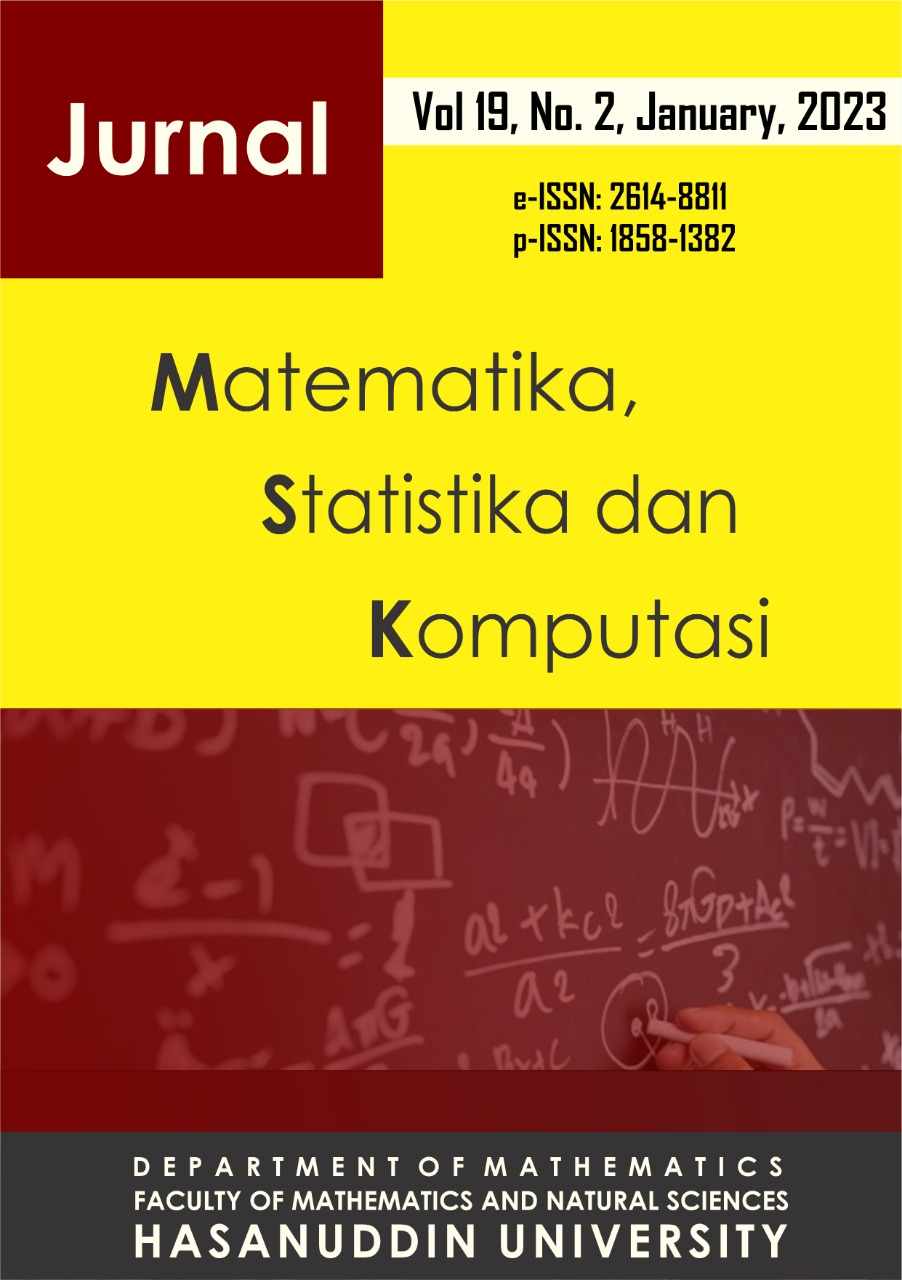Optimal Control of the Dynamics of the Spread of Covid-19 With Quarantine and Vaccination
Kontrol Optimal Dinamika Penyebaran Covid-19 Dengan Karantina Dan Vaksinasi
DOI:
https://doi.org/10.20956/j.v19i2.23989Keywords:
Selected:SEIR Model, Minimum Pontryagin Principle, Fourth Runge-KuttaAbstract
Vaccination and quarantine are effective ways to control the spread of disease. Vaccination helps susceptible individuals to boost immunity. Additionally, quarantine helps reduce interactions which will reduce the infection rate. This study proposed the SEIR mathematical model to describe the dynamics of the spread of COVID-19 by providing control in the form of vaccination and quarantine. Based on Pontryagin's minimum principle, the optimal system for optimal control problems is derived and solved numerically using the Fourth Order Runge-Kutta scheme with the Forward-Backward Sweep approach. A numerical simulation of the optimal problem showed that the spread of disease is eradicated more quickly by vaccination and quarantine. Vaccination in large numbers is needed earlier if the rate of contact transmission is high enough. The provision of quarantine control is required from the beginning until no longer to be applied. A large proportion of quarantine at the beginning of time can suppress the spread of disease in the population.Downloads
References
Aldila, D., Khoshnaw, S. H. A., Safitri, E., Anwar, Y. R., Bakry, A. R. Q., Samiadji, B. M., Anugerah, D. A., Gh, M. F. A., Ayulani, I. D., Salim, S. N., 2020. A mathematical study on the spread of COVID-19 considering social distancing and rapid assessment: The case of Jakarta, Indonesia. Chaos, Solitons & Fractals, 139, 110042. https://doi.org/10.1016/j.chaos.2020.110042
Annas, S., Isbar Pratama, Muh., Rifandi, Muh., Sanusi, W., Side, S., 2020. Stability analysis and numerical simulation of SEIR model for pandemic COVID-19 spread in Indonesia. Chaos, Solitons & Fractals, 139, 110072. https://doi.org/10.1016/j.chaos.2020.110072
Azzahra, N. F., Hariyanto, H., Mardlijah, M., 2022. Kontrol Optimal Penyebaran COVID-19 Model SEIR di Jakarta. Jurnal Sains dan Seni ITS, 11(2), A64–A69. https://doi.org/10.12962/j23373520.v11i2.76998
Iboi, E. A., Ngonghala, C. N., & Gumel, A. B., 2020. Will an imperfect vaccine curtail the COVID-19 pandemic in the U.S.? Infectious Disease Modelling, 5, 510–524. https://doi.org/10.1016/j.idm.2020.07.006
İğret Araz, S., 2021. Analysis of a Covid-19 model: Optimal control, stability and simulations. Alexandria Engineering Journal, 60(1), 647–658. https://doi.org/10.1016/j.aej.2020.09.058
Lenhart, S., & John T. Workman, 2007. Optimal Control Applied to Biological Models. CRC Press, Taylor and Francis Group.
Mahardika, D., Tjahjana, R. H., & Sunarsih, S., 2020. Optimal Control Modelling of Covid-19 Outbreak in Semarang City Indonesia. Journal of Fundamental Mathematics and Applications (JFMA), 3(2), 158–169. https://doi.org/10.14710/jfma.v3i2.8546
Mahardika, Y. D., 2021. Dynamical Modeling of COVID-19 and Use of Optimal Control to Reduce the Infected Population and Minimize the Cost of Vaccination and Treatment. ComTech: Computer, Mathematics and Engineering Applications, 12(2), 65–73. https://doi.org/10.21512/comtech.v12i2.6466
Mwalili, S., Kimathi, M., Ojiambo, V., Gathungu, D., & Mbogo, R., 2020. SEIR model for COVID-19 dynamics incorporating the environment and social distancing. BMC Research Notes, 13(1), 352. https://doi.org/10.1186/s13104-020-05192-1
Nisardi, M. R., 2022. Model Matematika Penyebaran Covid-19 Orde Fraksional dengan Skema Vaksinasi. Universitas Hasanuddin.
Resmawan, Eka, M., Nurwan, Achmad, N., 2020. Analisis Kontrol Optimal Pada Model Matematika Penyebaran Pengguna Narkoba Dengan Faktor Edukasi. Jurnal Ilmiah Matematika dan Terapan, 17(2), 238–248. https://doi.org/10.22487/2540766X.2020.v17.i2.15201
Sulma, Toaha, S., & Kasbawati, 2020. Stability Analysis of Mathematical Models of Meningitis Transmission dynamics with the Effects of Vaccination, Campaign, and Treatment. 17, 11. https://doi.org/10.20956/jmsk.%vi%i.10031
Yang, Z., Zeng, Z., Wang, K., Wong, S.-S., Liang, W., Zanin, M., Liu, P., Cao, X., Gao, Z., Mai, Z., Liang, J., Liu, X., Li, S., Li, Y., Ye, F., Guan, W., Yang, Y., Li, F., Luo, S., … He, J., 2020. Modified SEIR and AI prediction of the epidemics trend of COVID-19 in China under public health interventions. Journal of Thoracic Disease, 12(3), 165–174. https://doi.org/10.21037/jtd.2020.02.64
Downloads
Published
How to Cite
Issue
Section
License
Copyright (c) 2023 Author and publisher

This work is licensed under a Creative Commons Attribution 4.0 International License.

This work is licensed under a Creative Commons Attribution 4.0 International License.
Jurnal Matematika, Statistika dan Komputasi is an Open Access journal, all articles are distributed under the terms of the Creative Commons Attribution License, allowing third parties to copy and redistribute the material in any medium or format, transform, and build upon the material, provided the original work is properly cited and states its license. This license allows authors and readers to use all articles, data sets, graphics and appendices in data mining applications, search engines, web sites, blogs and other platforms by providing appropriate reference.








